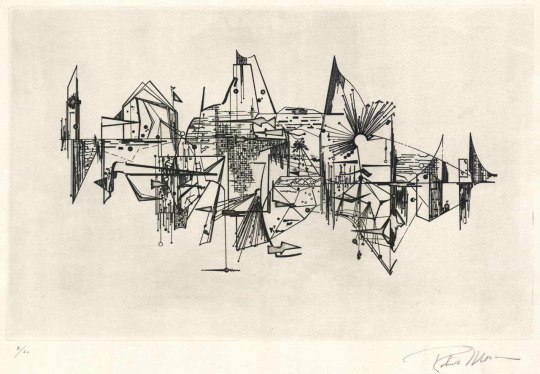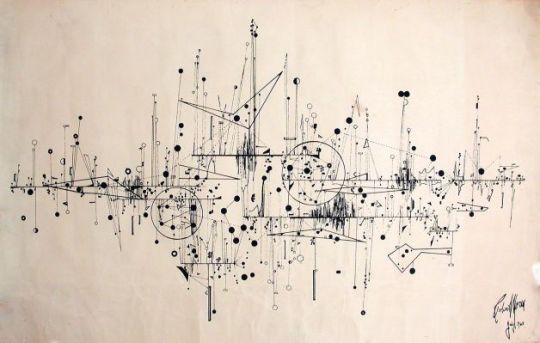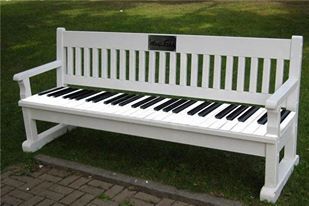Photo

occhigonfi-e-sorrisostanco
♡♡
708 notes
·
View notes
Photo


Robert Moran’s graphic scores: Fortress and Elegant Journey
"Moran […] was an important Bay Area figure during the 1960s, with stints as a composition teacher at the San Francisco Conservatory of Music. In his graphic scores - including ‘Elegant Journeys’ and ‘Fortress,’[…] Moran sketches out a format that allows for plenty of improvisation and chance encounters." - Joshua Kosman
205 notes
·
View notes
Quote
A great piece of music is beautiful regardless of how it is performed. Any prelude or fugue of Bach can be played at any tempo, with or without rhythmic nuances, and it will still be great music. That’s how music should be written, so that no-one, no matter how philistine, can ruin it.
D. Shostakovich. Letter to Isaac Glikman, August 28, 1955; Josiah Fisk & Jeff Nichols (eds.) Composers on Music (1997) p. 364. (via rjtyler)
350 notes
·
View notes
Conversation
Composers....
Romantic Composers: Piano is a melodic string instrument.
Early Contemporary Composers: Hm, maybe we can compose more abstract sounds for the piano
Mid Contemporary Composers: The piano is definitely a percussion instrument.
John Cage: Fuck that. MORE SCREWS, GIVE ME A COAT HANGER. STICK THAT MUG IN THERE. FuCK IT LETS ADD FIRE.
Modern Composers: FUCK IT EVERYTHING IS GoDDAMN PERCUSSION INSTRUMENT, THAT VIOLINS A PERCUSSION INSTRUMENT, YOUR TROMBONE IS A PERCUSSION INSTRUMENT, YOUr CAT IS A PERCUSSION INSTRUMENT.
76 notes
·
View notes
Photo

A late Happy Birthday to one of the most influential composers of the 20th century, Phillip Glass, who was born on January 31st 1937.
154 notes
·
View notes
Quote
To achieve great things, two things are needed; a plan, and not quite enough time
Leonard Bernstein
1 note
·
View note
Video
youtube
So it’s getting to that time of year, and that time of term, and that time in my dissertation. For my final year, I’m writing a dissertation about the development of the leitmotif in film music in the 20th century. The main composers I’m looking at include Erich Korngold, Bernard Herrmann (most famous for his iconic ‘shower scene’ music in Hitchcock’s ‘Psycho’) and Philip Glass. If you’re not into classical music but you have heard of Philip Glass, then it’s probably from GCSE music, where it was explained to you that he is one of the pioneers of a classical movement called minimalism. Most people turn their noses up at his work, and most people don’t actually understand that there is more to minimalist music than it seems. Although I’m moving away from my dissertation topic completely, reading about Glass and his works has inspired me to dig out an album I got for Christmas (fitting, right?) a few years ago. This album, called ‘Rework’ does exactly what it says on the tin. Influencial DJs, producers and musicians from all over the world have taken Glass’ immediately recognisable music, and made it into something very different. From the album, ‘NYC 73-78’ is my favourite track; leaving just enough of Glass’ style in amidst all the chaos for it to be both authentic and modern.
Nevada
12 notes
·
View notes
Video
youtube
As award season seems to be the biggest topic of conversation amongst film lovers and music lovers alike at the moment, I thought I’d post about the nominees, winners and potential winners for this year’s original scores. Having already posted about the score for ‘Gone Girl’, there’s not much point in banging on about it any further - however I was shocked to find that it wasn’t even nominated for best score at the BAFTAs. Films that were nominated include: ‘The Grand Budapest Hotel’, ‘Interstellar’, ‘Birdman’, ‘The Theory of Everything’ and ‘Under the Skin’. The award in the end went to Alexandre Desplat for The Grand Budapest Hotel. Desplat has been known for several great film scores in the last few years; (The King’s Speech, The Imitation Game), however his score for Wes Anderson’s latest film doesn’t seem to be typical of his beautifully classical, filmic touch. Instead, it seems to be typical of the kind of world in which Anderson’s films live; creating a sort of fairytale setting for a seriously absurd plot. Don’t get me wrong, I loved the film and thought that the score was incredibly fitting, however my personal favourite in the nominations was Hans Zimmer’s score for ‘Interstellar’. If you’ve seen the film, you know it has one of the most bizarre plots in recent sci-fi films, and that it is incredibly confusing at best. However, the score is brilliant; perfectly capturing the concept of earth vs. space, reality vs. time and family vs. ‘the odds’. It is also one of few films to use an organ as a prominent instrument. I personally hate Hans Zimmer as a composer, as I feel most of his music is stolen/boring/repetitive, but the soundtrack for Interstellar is proof that he is as famous and successful as he is for a reason!
Nevada
3 notes
·
View notes
Text
The one about statistics
Last year, I was told by a peer that I was less likely to become a composer because I was a woman (cue angry mob of feminist musicians). I have retold this story multiple times to friends and family, and each time I've told the story I've said: "but to an extent, he's right - women simply have less of a chance in the musical world than men". Looking back on this, I wish I had never attempted to defend him, let alone let him walk free without a punch in the face.
I am currently fighting my way through the musical conservatoire system in the UK to try and earn a place studying for Masters degree in Composition - specialising in composition for screen. Have I looked up the male:female ratio for postgraduate masters places in composition? No. Have I mentioned anything in my personal statement about having to overcome the fact that I have breasts and not a penis? No. I don't want to know that my chances may be slightly worse because I am female, and I don't want to make excuses to anyone in the world about having to overcome the trials and tribulations of being a woman. For anyone that is on the fence about gender bias in the musical world: GENDER HAS NOTHING TO DO WITH IT, AND NEVER WILL.
In my mind, the people who talk about women not being as capable as men, or not as mentally/physically strong as men, or not being as charming and co-operative as men are not only plain wrong, but even worse: furthering the old-fashioned and ridiculous idea that when it comes to being a musician, you have more of a chance because you are male. But what about statistics? Yes, statistics, the media and even music history will tell us that there are more 'successful' men in classical music than women. But putting these 'facts' together with the FACT that there are more women on the planet than men only tells us that the reason for this can only be down to the fact that women are being actively prevented from joining in. Yes, women are generally physically weaker than men but how on earth would that affect their chances of becoming composers? I'm dying for someone to explain to me what the other disabilities of being a woman actually are.
One suggestion came from the same peer: "Women have less chance of being composers because, when they come to conduct their music, they are too distracting to watch". Now here is where it gets really ridiculous. "Too distracting to watch" is - I'm assuming - referring to the female form, and the way women dress. Or is it simply because women haven't been allowed into the orchestra/choir either, and therefore all of the players/singers are too 'manly' to concentrate on their music rather than looking down the conductors blouse? I can tell you now, this is not the case. Professional musicians give respect to their conductors whether they are male or female. More than this, the term 'professional musicians' includes heterosexual men and women and gay men and women. If an orchestra was made up of only gay men would it then become inappropriate to have a male conductor? The answer is no.
I understand of course that these extreme opinions are only shared by a small minority of people in the musical world, and that there are plenty of men and women out there who believe in equal rights to musical careers. Because of this, I refuse to have my gender mentioned when it comes to pursuing my dream job, and I refuse to let anything like small-minded opinions and centuries of controlling men to get in my way. Without wanting to rant any further, it is only appropriate to mention the hundreds of female role models in the classical world for young girls and women to look up to. For me, the biggest role model is my mother - who although never pursued a career in music - is not only an incredible pianist and singer, but a prime example of a woman who proved that gender had nothing to do with it when getting to the top of her career.
1 note
·
View note
Video
youtube
At the beginning of the summer this year, I was lucky enough to be involved in an exciting new opera called: 'Arcana', produced by the Bristol company: Little Rooms Productions. The concept of the opera is based on tarot cards; the characters in the story representing the cards and their meanings. As one of the composers involved, I composed two solo pieces for the show. My favourite of the two pieces centres around something very important: the relationship between a mother and her child.
'The High Priestess' is essentially the monologue of a working woman talking about her child, only to realise at the end of the piece that her child isn't really there. If you're wondering how that relates in any way to the tarot card 'The High Priestess', then it is the motherly and all-knowing love of the card that is reflected in the character. It is particularly important to me, because the card is all about female presence and strength. In the music, I've tried to convey a kind of sombre lullaby that delicately frames the life of this lonely woman. The recording is taken from one of the live performances of the show, and is sung so beautifully by one of the Arcana cast.
It's brilliant to be able to share this recording on my blog. For those that didn't make it to the show in the summer, here is just a small glimpse into the concept of the show - and don't forget that Arcana: Part II will be premiering in Bristol in January 2015.
0 notes
Quote
Music begins where the possibilities of language end
Jean Sibelius
0 notes
Video
youtube
Went to see The Aurora Orchestra in November where they performed a live rendition of 'Music for 2 acoustic toothbrushes' and it was definitely one of the best concerts I have ever seen. Never watched the Mendelssohn octet, knife & fork and wine glass percussion, and live rhythmic tooth brushing in the space of an hour before. The Aurora Orchestra were absolute incredible - they are a MUST SEE!
0 notes
Text
The one for the great composer
One of the greatest figures of contemporary classical music died on 12th November 2013 at the age of 69. John Tavener was incredibly influential in the holy minimalist movement - along with Arvo Part - and will always remain a great influence in my own composition. It is such a sad moment when such an influential figure passes away, but the silver lining is that we are left with so many beautifully spiritual compositions.
One of Tavener's most famous pieces is 'The Lamb'. I first came across this odd choral piece when I was about 11, and was forced to sing it in my school carol concert. At the age of 11, I thought the piece was completely ridiculous, and sounded as if it had been written by a tone-deaf composer. However, having sung it in the same carol service for the next seven years, as well as studying it in GCSE and A-level, this piece is now rather close to my heart. Not only does it remind me not to judge contemporary choral music so harshly, but it also reminds me of my old school, my old choir and my old choirmaster.
When studying the piece, it became apparent very quickly that the first section of the work is merely an exercise in all of the techniques one could possibly use to transform a single phrase. Sung by the higher voices, this phrase is a metaphor for innocence and spirituality. Written in retrograde, inverted and augmented - this one refrain repeats throughout the piece. The phrase is often presented by itself, or with the inverted version accompanying it (creating a very surreal harmony) - but the most beautiful moments in this work are when the lower voices enter, and the choir ask the question: 'Little lamb, who made thee?'. By far one of the most moving choral works I know, 'The Lamb' is definitely worth listening to if you aren't yet familiar with it.
The passing of a composer is a particularly sorrowful one, as it urges one to think about the music we could have had if they were still with us. Fortunately, the musical world is incredible, and the works that Tavener might have written if he were still alive will - in a way be written anyway - by the huge number of composers that he has most definitely inspired.
1 note
·
View note
Text
The one in the Albert Hall
Some of you may have already seen from my pictures on Facebook that I went to go and see the famous Lang Lang play a piano recital of Mozart and Chopin at the Albert Hall last night. I managed to get the tickets free, as a friend couldn't go - so it was something I wasn't going to pass up (even if it did mean I had to fight my way through busy Christmas shoppers in central London all day...). Having had the most ridiculously busy week at University, (a combination of a cold and about a million deadlines) I didn't have the time to look up what he was actually playing, so was incredibly disappointed when I bought my programme and realised he was playing three Mozart sonatas and the Chopin Ballades. As much as I love Mozart and Chopin, these pieces are SO overplayed that I was almost dreading sitting through a two hour recital with one of the most respected pianists in the world.
However, the incredible thing about performance is, that is it never the same twice. Not only this, but with the skill, precision and control of a professional pianist, it didn't disappoint at all. The most bizarre thing about it was that I had played all of the Mozart sonatas when I was a child, and the way I remembered them was nothing compared to the performance that Lang Lang gave. I'm aware that some people label his performance style as OTT and self-indulgent, but he really does know how to turn an already beautiful work into a show, captivating the entire audience of the Albert Hall. In the interval, my mother and I stood at the bar waiting for drinks, discussing what we thought of the performance. Behind me was an elderly couple, complaining at the amount of children at the performance. Although there was a surprising amount of children there, I couldn't believe my ears.
There seem to be all sorts of articles, statistics and other sources constantly stating that Classical and Jazz are 'dying' because of the lack of interest from younger people. On top of this, these two older people had the audacity to complain about the presence of children at a Classical concert, when I couldn't think of a more appropriate age bracket to be there. These children were sitting through two hours of classical music in silence, concentrating on this 'dying art form' - and this couple couldn't appreciate that. Yes, the majority of the audience were over 60, and were the typical audience you expected to see in the Albert Hall.
However, the thought later occurred to me that Classical music often has an older audience because they have a lot more free time. Retired people with little to do in the day, and more money to spend than any child or student are obviously going to be the main audience for Classical concerts, as they are bloody expensive! We complain about children not attending concerts in the Royal Albert Hall or exhibitions in the V&A because they are probably too busy being children, at school or playing with their friends. Moreover, it is ridiculous to me that anyone would complain about their presence when they have made the effort. I might add that this elderly couple proceeded to leave early and very loudly during the concert, and tripped over a glass of wine, making complete asses of themselves.
0 notes
Quote
Works of art make rules; rules do not make works of art
Claude Debussy
0 notes




